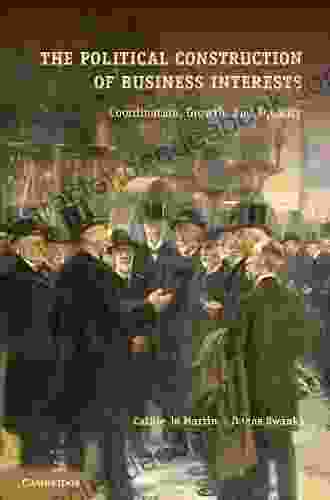The Political Construction of Business Interests: An Interdisciplinary Perspective

The relationship between business and politics is a complex and multifaceted one that has been the subject of extensive research and debate. In recent years, there has been growing interest in the concept of the "political construction of business interests." This concept refers to the idea that the interests of businesses are not simply a reflection of their economic activities, but are also shaped by political factors.
5 out of 5
| Language | : | English |
| File size | : | 2191 KB |
| Text-to-Speech | : | Enabled |
| Screen Reader | : | Supported |
| Enhanced typesetting | : | Enabled |
| Word Wise | : | Enabled |
| Print length | : | 640 pages |
This article explores the political construction of business interests from an interdisciplinary perspective. It draws on insights from political science, economics, and sociology to provide a comprehensive analysis of the topic. The article begins by outlining the different theoretical approaches to the political construction of business interests. It then examines the empirical evidence for the political construction of business interests, drawing on a variety of case studies. Finally, the article discusses the implications of the political construction of business interests for economic outcomes.
Theoretical Approaches to the Political Construction of Business Interests
There are a variety of theoretical approaches to the political construction of business interests. One common approach is the "pluralist" approach. Pluralists argue that the political system is essentially a competition between different interest groups, each of which seeks to promote its own interests. Businesses are just one of many interest groups that compete for influence in the political process.
Another common approach is the "corporatist" approach. Corporatists argue that the political system is dominated by a small number of large corporations that have a disproportionate amount of influence over the policymaking process. Businesses are seen as having a privileged position in the political system, and they are able to use this privilege to promote their own interests.
A third approach to the political construction of business interests is the "state-centered" approach. State-centered theorists argue that the state plays a central role in shaping the interests of businesses. The state can do this through a variety of mechanisms, such as regulation, taxation, and subsidies.
Empirical Evidence for the Political Construction of Business Interests
There is a growing body of empirical evidence that supports the concept of the political construction of business interests. This evidence comes from a variety of sources, including case studies, surveys, and econometric analysis.
One of the most well-known case studies of the political construction of business interests is the case of the tobacco industry. The tobacco industry has been able to successfully resist government regulation for many years, despite the fact that there is clear evidence that smoking is harmful to health. This is due in part to the industry's extensive lobbying efforts and its close ties to politicians.
Another well-known case study is the case of the oil industry. The oil industry has been able to successfully influence government policy on issues such as oil prices, drilling, and environmental regulation. This is due in part to the industry's vast financial resources and its ability to mobilize public opinion.
Surveys of business leaders also provide evidence for the political construction of business interests. These surveys show that business leaders believe that the political system is biased in favor of large corporations. They also believe that the government is more likely to respond to the demands of businesses than to the demands of other groups in society.
Econometric analysis has also found evidence for the political construction of business interests. This analysis has shown that businesses that are more politically active are more likely to be profitable. This suggests that businesses can use their political power to improve their economic performance.
Implications of the Political Construction of Business Interests for Economic Outcomes
The political construction of business interests has a number of implications for economic outcomes. First, it can lead to inefficient economic policies. When businesses are able to use their political power to influence government policy, they can often do so in a way that benefits themselves at the expense of the economy as a whole. For example, the tobacco industry's successful resistance to government regulation has led to higher rates of smoking and smoking-related illnesses.
Second, the political construction of business interests can lead to inequality. When businesses are able to use their political power to improve their economic performance, they can often do so at the expense of other groups in society. For example, the oil industry's successful influence over government policy on oil prices has led to higher prices for consumers and businesses.
Third, the political construction of business interests can lead to a loss of public trust in the political system. When people see that businesses are able to use their political power to influence government policy in their favor, they may lose trust in the fairness and legitimacy of the political system. This can lead to cynicism and apathy, which can make it difficult to address important social and economic problems.
The political construction of business interests is a complex and multifaceted phenomenon. It has a number of implications for economic outcomes, including inefficiency, inequality, and a loss of public trust in the political system. It is important to understand the political construction of business interests in order to develop policies that can mitigate its negative consequences.
5 out of 5
| Language | : | English |
| File size | : | 2191 KB |
| Text-to-Speech | : | Enabled |
| Screen Reader | : | Supported |
| Enhanced typesetting | : | Enabled |
| Word Wise | : | Enabled |
| Print length | : | 640 pages |
Do you want to contribute by writing guest posts on this blog?
Please contact us and send us a resume of previous articles that you have written.
 Book
Book Novel
Novel Page
Page Chapter
Chapter Text
Text Story
Story Paragraph
Paragraph Sentence
Sentence Shelf
Shelf Glossary
Glossary Synopsis
Synopsis Annotation
Annotation Manuscript
Manuscript Scroll
Scroll Codex
Codex Classics
Classics Library card
Library card Autobiography
Autobiography Memoir
Memoir Reference
Reference Dictionary
Dictionary Narrator
Narrator Character
Character Resolution
Resolution Stacks
Stacks Archives
Archives Periodicals
Periodicals Study
Study Research
Research Scholarly
Scholarly Lending
Lending Academic
Academic Journals
Journals Special Collections
Special Collections Dissertation
Dissertation Awards
Awards Reading List
Reading List Book Club
Book Club Theory
Theory Textbooks
Textbooks Michael John Witgen
Michael John Witgen Thomas Healy
Thomas Healy Kimberly Leclaire
Kimberly Leclaire Laura E Pinto
Laura E Pinto Denise M Canela
Denise M Canela Louise Read
Louise Read Thomas Keil
Thomas Keil Hector Borlasca
Hector Borlasca Brian Hughes
Brian Hughes Michael Robinson
Michael Robinson D V Lindley
D V Lindley Oscar Wilde
Oscar Wilde Olga Grushin
Olga Grushin Mercedes Lackey
Mercedes Lackey Matthew Curtis
Matthew Curtis Steve Thompson
Steve Thompson Josie Brown
Josie Brown Ian Taylor
Ian Taylor Amy Spencer
Amy Spencer Jon Ward
Jon Ward
Light bulbAdvertise smarter! Our strategic ad space ensures maximum exposure. Reserve your spot today!
 Sammy PowellFollow ·10k
Sammy PowellFollow ·10k Rudyard KiplingFollow ·14k
Rudyard KiplingFollow ·14k Arthur C. ClarkeFollow ·6k
Arthur C. ClarkeFollow ·6k Willie BlairFollow ·15.9k
Willie BlairFollow ·15.9k James JoyceFollow ·19k
James JoyceFollow ·19k Troy SimmonsFollow ·6.9k
Troy SimmonsFollow ·6.9k Henry HayesFollow ·7.4k
Henry HayesFollow ·7.4k David PetersonFollow ·15.4k
David PetersonFollow ·15.4k

 Ronald Simmons
Ronald SimmonsHow Do Cities Work? Let's Read and Find Out!
Cities are...

 Tom Clancy
Tom Clancy25th European Symposium on Research in Computer Security...
<p>Guildford,...

 Lawrence Bell
Lawrence BellHow We Decide: Cognitive Behavior in Organizations and...
Organizations are...

 E.M. Forster
E.M. ForsterOver 60 Little Masterpieces To Stitch And Wear:...
Embark on a Creative...

 Douglas Foster
Douglas FosterUnveiling the Educational Treasure: CGP KS2 Geography:...
In the ever-evolving educational...
5 out of 5
| Language | : | English |
| File size | : | 2191 KB |
| Text-to-Speech | : | Enabled |
| Screen Reader | : | Supported |
| Enhanced typesetting | : | Enabled |
| Word Wise | : | Enabled |
| Print length | : | 640 pages |














